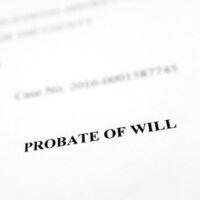How To Avoid Probate

When you pass, your family may find themselves having to go to court to prove your will left is valid or to address any other concerns about your property. This process is referred to as “probate.” The probate process can often be unnecessarily contentious, extensive, and expensive. As such, the following article will discuss some ways that an individual can avoid the probate process altogether.
What is probate?
Probate is a legal process that occurs after someone dies and typically includes:
- Proving that a will is valid
- Identifying and inventorying property
- Having property appraised
- Ensuring that any debts and taxes are paid
- Distributing any remaining property according to the terms of the will
Why should I try to avoid probate?
You should try to avoid probate for some of the following reasons:
- Your family may not be able to access your money right away. With the probate process, it can take weeks or even months for your family to access the money you left them. This means they may have to figure out how to pay for expenses such as your funeral or your household utilities.
- A probate judge will have to approve every action during the process. Your family will likely need court approval for actions such as running or selling your business, repairing or selling any real estate you own, or abandoning worthless assets.
- The probate process can be expensive. The probate process involves the payment of court filing fees, including probate fees. If your family uses an attorney to help with the process, he will need to be paid as well. These fees are typically payable out of your estate, which could mean that your family may receive less money than you originally anticipated.
- Probate records are matters of public record. Probate is a state court proceeding, which means that all information about a deceased person’s assets, liabilities, beneficiaries, and personal representatives are a matter of public record and as such, anyone can access your probate court file and find out just about anything he wants to know.
How can I avoid probate?
You can avoid probate by taking some of the following steps:
- Consider giving away your assets while you’re alive. You might be able to get your estate to a simplified or exempt probate position by reducing its value while you are alive. This would require you to distribute your assets to family and friends now. This can reduce the amount of your estate that needs to go through probate and could potentially reduce or even eliminate future federal and state estate taxes.
- Establish a living trust. Trusts are appealing when it comes to avoiding probate because property held in trust is not part of your estate upon your death. With a trust, another person (called the “trustee”) controls the trust property and is obligated to distribute it according to the terms of the trust agreement after your death.
- Make accounts payable on death. Bank accounts and other accounts that are payable on death go directly to your designated beneficiary without having to go through probate.
- Own property jointly. Making your spouse or someone else a joint owner of property facilitates the transfer of that property without the need for probate.
Contact Our NorwoodFirm For All Of Your Estate Planning Needs
The estate planning process can often be complicated. The experienced Greater Norwood estate planning attorneys of Fisher Law LLC can thoroughly explain your options and guide you throughout the process.
